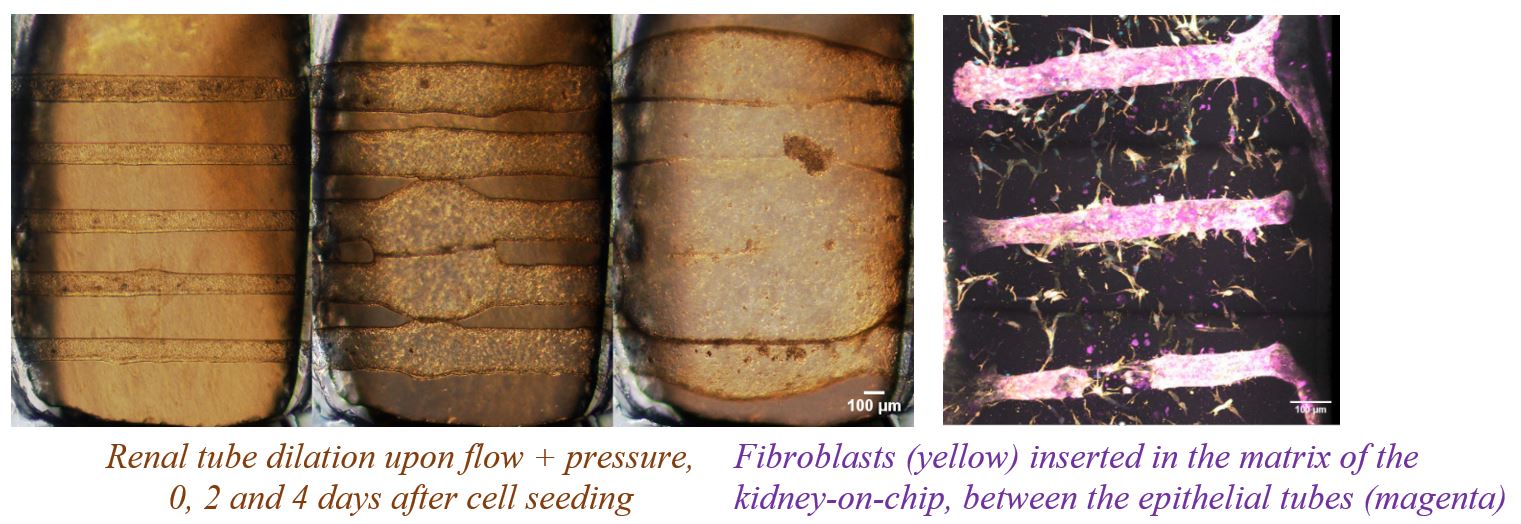Genetic renal kidney diseases lead to the development of numerous cysts in the renal tubules, ultimately leading to kidney failure. Despite extensive work on the genetics and cell biology of these diseases, the precise mechanism of cyst formation, resulting from localized dilatation of the renal tubules, remains imperfectly understood. Renal tubules have an extremely controlled geometry and are permanently subjected to mechanical constraints. Our hypothesis is that these mechanical determinants play a key role in cyst formation. The most common genetic kidney disease, Autosomal Dominant Polycystic Kidney Disease (ADPKD), leads to the alteration of proteins, polycystins, involved in mechanotransduction and flow sensing. Cysts arise initially from somatic mutations inactivating further polycystins in a few cells. This leads presumably to localized tube dilation and cyst formation upon the mechanical constraints experienced by the tubule. In a second time, these mechanical constraints are reinforced due to compression by expanding cysts.
In order to finely study the mechanical contributions in ADPKD, we have developed an original kidney-on-chip with versatile geometries, stiffness and adhesive properties, using microfabrication and microfluidic techniques. This is to our knowledge the most complete system specifically developed to understand the physical mechanisms of cyst formation in the disease. The kidney tubules can be lined with renal epithelial cells either model of healthy cells or of the disease, which we have previously shown to induce tube dilation, with the additional possibility to insert support cells like fibroblasts in the matrix. The purpose of this internship will be to study in our device the mechanisms involved in the tubular deformation induced by model ADPKD cells, in the presence or absence of flow or mechanical compression. The relative contribution of traction forces exerted by cells, of collagen remodeling by secreted factors, and of liquid secretion by cells in the lumen, will be evaluated by pharmaceutical studies targeting tube dilation, by direct force measurements, by optical characterization of collagen organization around tubes and by osmotic pressure application.
This internship will include microfabrication to build the microfluidic devices previously developed in the team, cell culture, immunofluorescence, force measurements by Traction Force Microscopy or fiber deflection, and imaging by confocal or video microscopy for cell organization in tubes, or Second Harmonic Generation for collagen organization.
- Cornec-Le Gall, E., Alam, A. & Perrone, R. D. Autosomal dominant polycystic kidney disease. Lancet 919–935 (2019)
- Lapin B, Myram S, Nguyen ML, Gropplero G, Coscoy S, Descroix S (2023) Construction of a multitubular perfusable kidney-on-chip for the study of renal diseases. Methods in Molecular Biology Kidney Research, Experimental Protocols, Third Edition. 2664:85-106. doi: 10.1007/978-1-0716-3179-9_7.
- Myram S, Venzac B, Lapin B, Battistella A, Cayrac F, Cinquin B, Cavaniol C, Gropplero G, Bonnet I, Demolombe S, Descroix S, Coscoy S. (2021). A multitubular kidney-on-chip to decipher pathophysiological mechanisms in renal cystic diseases. Frontiers Bioeng. Biotechnol., doi: 10.3389/fbioe.2021.624553
- Venzac B, Madoun R, Benarab T, Monnier S, Cayrac F, Myram S, Leconte L, Amblard F, Viovy JL, Descroix S, Coscoy S. (2018) Engineering small tubes with changes in diameter for the study of kidney cell organization. Biomicrofluidics. 12(2):024114. doi: 10.1063/1.5025027.
- Bhoonderowa L, Hameurlaine F, Arbabian A, Faqir F, Amblard F, Coscoy S (2016) Polycystins and intercellular mechanotransduction: A precise dosage of polycystin 2 is necessary for alpha-actinin reinforcement of junctions upon mechanical stimulation. Exp Cell Res, 348(1):23-35
- Leonhard, W. N. et al. Scattered Deletion of PKD1 in Kidneys Causes a Cystic Snowball Effect and Recapitulates Polycystic Kidney Disease. J Am Soc Nephrol 26, 1322–1333 (2015).
